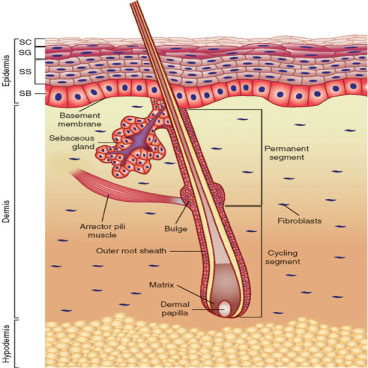General Facts Of Hair

General facts Of Hair :
- Hair is made up of a protein called keratin.
- The hair fiber has three cell layers: 1.An outer cuticle, the cortex (which forms the bulk of the fiber in most hair types)
- 2. Ovariable central medulla
- It is fixed to skin through a tubular structure called as hair follicle. A hair follicle extends from skin surface into the dermis (middle layer of skin).
- The hair follicle is divided into two regions:
- The upper part consisting of the infundibulum and isthmus
- The lower part comprising the hair bulb and suprabulbar region
- The upper follicle is a relatively constant structure, whereas the lower follicle undergoes repeated episodes of regression and regeneration during the hair cycle.
- Cells from hair bulb give rise to different layers of hair fiber
- Many glands like sebaceous glands(oil producing glands of skin) also open in hair follicle
- On the scalp, and some other regions of the skin, hair follicles are arranged in groups of three or more follicles known as follicular units
- Every person NORMALLY has around 50 to 100 strands of hair fall in a day
Hair cycle :
Hair follicles undergo a repetitive sequence of growth and rest known as the hair cycle;
- It consists of three stages, Anagen, Catagen & Telogen
- Anagen: The period of active hair growth.
- The duration of this phase is responsible for determining the final length of the hair.
- Under normal circumstances 80–90% of hair follicles on the human scalp are in Anagen at any one time.
- Catagen: the resting stage of hair cycle
- Telogen: the shedding stage of the hair cycle
Each hair follicle of every human being will have to go
through these stages, thus we all shall experience hair fall
normally as well.
When the shedding / hair fall is beyond
normal, treatment becomes mandatory.
